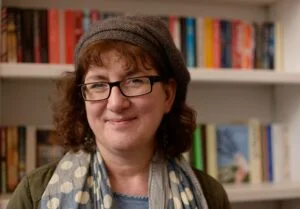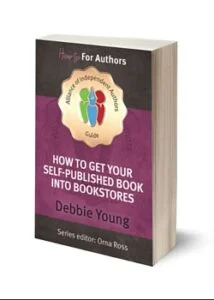
Debbie Young snapped at the indie-friendly Anthology bookshop, Cheltenham (photo by Angela Fitch Photography)
Debbie Young, ALLi Author Advice Center Manager and author of ALLi's guidebook about bookstores offers helpful advice about dealing more effectively with bricks-and-mortar bookstores.
When we were children, traditional bricks-and-mortar bookstores were our main source of books, besides public or school libraries and whatever lay inside our own homes. Little wonder that many indie authors still crave the opportunity to see their own books stocked on their shelves. However, many indie authors give up their dream of reaching more readers that way for several reasons such as:
- misinformation that bricks-and-mortar bookstores have a blanket ban on all self-published books
- misapprehension that physical bookstores are a dying breed so not worth pursuing
- rejection after approaching a local store or the head office of a big chain
- inability to make a profit from the conventional bookstore distribution network that require a substantial discount for the retailer
At ALLi, we believe that where booksellers and indie authors understand each others' needs and practices, and work together to accommodate the special structure of their market, it is possible for both parties to work together for mutual benefit and to mutual profit.

Running a writers' group at a bookstore can help you build a great relationship with its proprietor (The Cheltenham Anthology's owner Helene Hewett is seated behind Debbie Young) (Picture by Angela Fitch)
However, to tap into these possibilities, indies need to be able to see the bookstore from the bookseller's side of the trade counter and to appreciate:
- the structure of the distribution system
- the bookseller's business model
- the financial constraints of the book retail trade
Understanding these factors will then enable indie authors to:
- ensure their book meets the high standards required by bookstores (standards which should apply to all self-published books, wherever they are sold)
- target the bookstores most likely to stock their books
- approach their target stores in a professional and effective way, thus increasing their chances of getting their books stocked
It's Not Just About Books on Shelves
However, there are more ways to work with bookstores than simply getting your books stocked on their shelves – something that in any case is done only fleetingly for trade-published authors, and for relatively few of them. The best bookstores also have active events programmes, and it's possible for indie authors to play a part in these on a consignment basis (ie the stores stocks your books only for the duration of an event), whether or not they stock your books from day to day.
A good bookstore is likely to welcome any proposition with potential to bring more customers across its threshold, and not only at the time of a book's launch.
Post-launch events either as a one-off or as part of local literary festivals also provide good opportunities for indies.
By dint of their independence, self-published authors and those published by small presses have the freedom to be more flexible, pro-active and savvy than those who are allied with big publishing houses.
All easier said than done, you might be thinking, but where do I go from here to stake my claim to bookstore action?
First piece of advice: leave any sense of entitlement outside the bookstore's door. Many millions of books are available whose authors may feel as strongly as you do that their work deserves a place on the bookstore's shelves (not to mention the top-selling classics penned by dead authors!) There is literally no room for us all, even in the biggest of bookstore chains.
Second piece of advice: as with so much in self-publishing, this as a long-term game, so take time to understand bookstores, build relationships, before following through with considered and appropriate actions.
Now Read the ALLi Guidebook!

Ebook available as free download to ALLi members, and for non-members to buy from all the usual retail channels
The good news is that ALLi's guidebook, How to Get Your Self-published Book into Bookstores, will fast-track your quest, by elaborating on all of those factors mentioned above, as well as offering inspiring examples and role models of indie authors working effectively with bricks-and-mortar bookstores.
Paid ALLi members can download an ebook free (along with the other guidebooks in our Successful Self-publishing series – one of 21 reasons to join ALLi) by logging into our membership website at www.allianceindependentauthors.org.
Non-members can buy it in paperback or ebook from all the usual suppliers.
You might even want to order it from your local bookshop – just quote 9781909888494 – now there's a conversation starter with your bookseller!
It's Up to You
If after reading the guidebook you still think it's in your best interests to bypass bookstores and focus on online sales instead, as so many indie authors do, that's fine – that's your prerogative, and we respect it.
But at least you'll be doing it for the right reasons: because you've found out the facts and made an informed choice.
OVER TO YOU Have you had a positive experience of working with a bricks-and-mortar bookstore? Your case study might inspire others to follow suit, so we'd love to hear about it!
#Indieauthors - wondering how (or even whether) to get your #selfpub books into physical bookstores? This new post will set you on the right track - by @DebbieYoungBN, author of the ALLi guidebook on #Authors4Bookstores Share on XOTHER USEFUL POSTS ABOUT SELLING SELF-PUBLISHED BOOKS VIA PHYSICAL BOOKSTORES
From the ALLi Author Advice Center Archive




